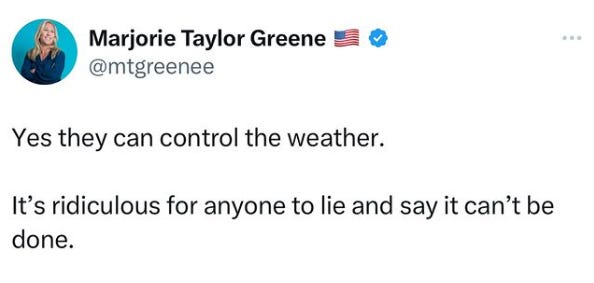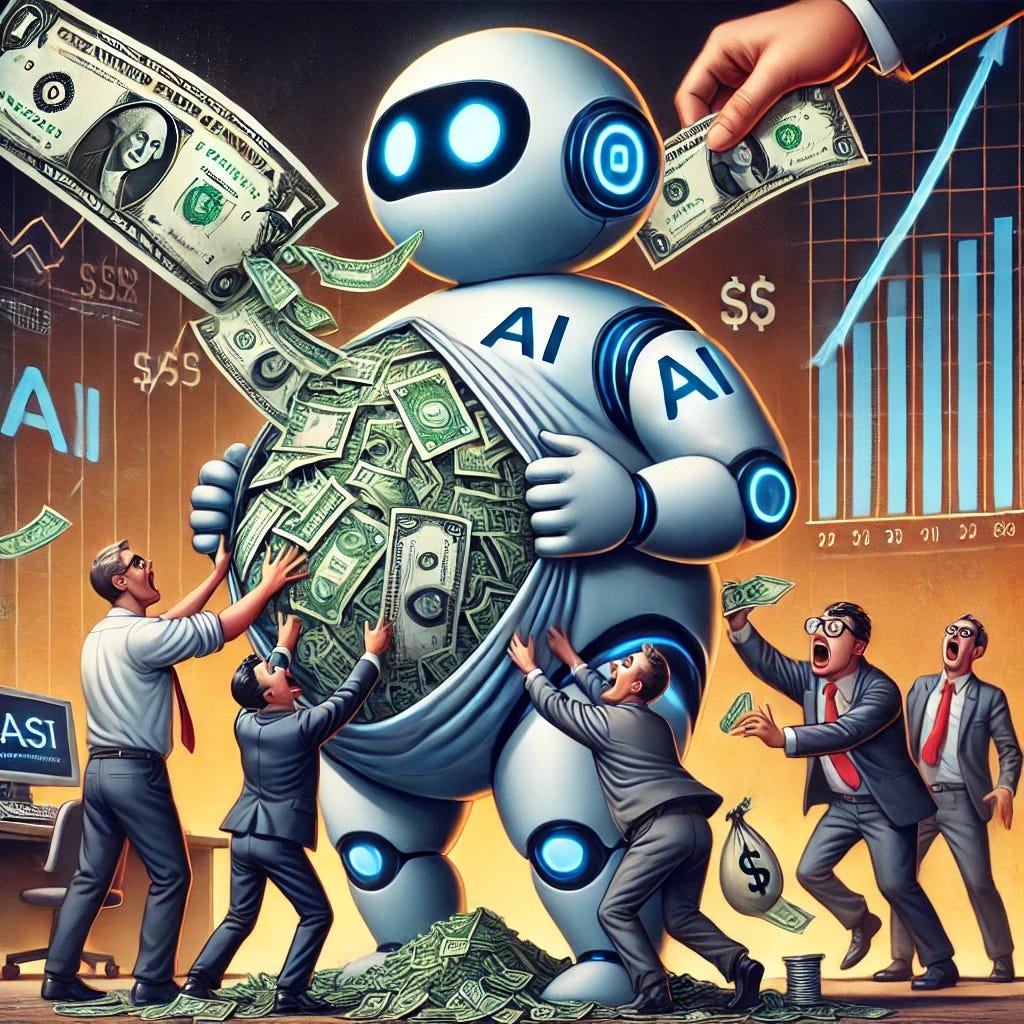AI Is Not Coming for Your Job. Maybe.
Let's refresh the prognostications of AI's effect on the job market specifically and macroeconomics in general.
All the way back at the beginning of Q2 this year we dove into what AI might actually mean for your job and the larger macroeconomic environment. The spectrum of the various bookmakers is wide - from a nearly wholesale replacement of the human workforce to nothing for the next 5-7 years until the technology proves itself beyond making funny pictures and fake legal cases.
It’s time to revisit where AI workforce predictions are, given a new crystal ball view from a noted MIT professor that focuses more on the financial aspect of the companies creating AI vs. their actual technical abilities to replace your job.
Prereqs
I’d suggest re-reading the original post about this, but I know we’re all busy. As a quick recap, here’s where we landed in April:
AI won’t really be touching jobs in the near term, but by 2030 the predictions vary as to how many - and what kind - of jobs will be in jeopardy when Skynet becomes self-aware;
The major tech companies may have claimed that AI was already reducing headcount, but a deeper dive showed the reality wasn’t nearly as clear-cut as the executives (whose very compensation is based on stock price, most easily boosted by mass layoffs) would have you believe;
AI will eventually change the professional landscape, but that should make humans even more valuable in the labor market, not less;
Major societal issues like universal basic income and wealth inequality will need to be addressed before AI supercharges the ills brought on to Western societies in the throes of late-stage capitalism.
A New Challenger Has Entered the Ring
You may have read Why Nations Fail when it came out in 2012 - it was a tome that added to (and went up against) previous works in the same vain like Jared Diamond’s Guns, Germs, and Steel. It caused a bit of an academic kerfuffle when it was published, with some quality, if not nerdy, back-and-forth between scholars.
One of the authors of that book, MIT Institute Professor Daron Acemoglu, recently told Bloomberg in an interview that he felt that the AI hype train had gotten a bit overloaded and that in reality, the share of jobs that AI will replace is about 5% — much less than some of his fellow scholars have predicted. He also warned that the investments being poured into AI are heading into bubble territory.
He saw AI and the companies behind it heading towards three scenarios:
The hype itself dies down at a reasonable pace and AI use cases enter the workforce in a productive and reasonable manner;
AI frenzy continues for the next 12 months or so, after which the bubble pops and those who invested in it (either financially, or in the time to learn it) sour on it, hurting its ultimate utility;
The frenzy continues for years, companies fire workers in anticipation of wholesale job replacement, only for the technology not to live up to the hype and these same firms must rush to rehire the same workers they fired to get back up to base level productivity.
Obviously the third is the least desirable, but Acemoglu sees a combination of two and three as the most likely outcome. As much as this newsletter would like to see number one rule the day, the idea that major tech firms will be forthcoming about shortcomings of their product and its underlying technology to allow for the kind of reasonable implementation predicted by Acemoglu is nil.
So Most of Our Jobs Are Safe, Right?
There are no sure things when it comes to AI - just like the machines created in the gold rush of artificial intelligence, no one can tell the future quite yet. They can only divine what they think will come next from past data and the patterns that lie within.
For every Nostradamus-like proclamation that AI will claim a small amount of jobs, there are others in the space betting on the exact opposite. For an extreme example of this, revisit Marc Andreessen’s The Techno-Optimist Manifesto - it’s a fever dream of AI wholesale replacing jobs in today’s labor market.
Then throw a dart at any respectable publication’s Technology section and you will find an argument in between Acemoglu’s and Andreessen’s - with evidence supporting anywhere between 5% and 110% of jobs being replaced by AI.
Governance - Corporate and Model
Let’s take a deep dive into the US leader of artificial intelligence - OpenAI. It recently closed a $6.6 billion funding round, valuing the company at just under $160 billion. That puts it in the realm of the GDP of a country like Morocco, Kuwait or Ukraine, depending on what data source you use.
And this is where Acemoglu is on to something. We know that despite the fancy releases and the magic-like product of ChatGPT, OpenAI is a poorly run company — the corporate governance there rivals that of a dysfunctional family forced to spend Christmas snowed in together (I smell a new Hallmark movie.)
The firing and re-hiring of Sam Altman late last year showed us a glimpse of that, with the dysfunction even infecting Microsoft and their revered CEO Satya Nadella, who, along with the entire OpenAI board, ended up looking bad coming out of that debacle.
More recently, an executive shakeup saw the company’s chief scientist/co-founder, chief technology officer, chief research officer, and VP of research all announce their departures. This spooked some investors out of the recent round - most notably Apple. This is all occurring against the backdrop of the company - founded as a non-profit - working towards full for-profit status, which would have major implications of how it is governed.
One final layer here: the company’s valuation has doubled in less than a year, as companies like SoftBank, the UAE sovereign fund, and Kushner brothers-founded Thrive Capital pour money into it. They’ve also more than doubled the size of the company in nine months (ask Amazon how that goes) - even as they continue to lose billions every year. It’s not doomed to fail by any means - companies have come out of worse starts - but to say that a bubble might be forming wouldn’t be the craziest thing, given that this is the most visible AI investment vehicle.
Finally, this begs the question: if the corporate governance is this bad, what does the model governance look like? Model governance not only ensures that the AI technology is being developed and utilized ethically and within a guard railed environment as to avoid any unwanted humanity-destroying features, but also to make sure the product itself works well, is accurate, and is useful for what it’s being promised to do.
This newsletter thinks that Professor Acemoglu’s statement is overly conservative, but he raises enough good questions at a time of immense change and challenge in the AI space that he cannot simply be dismissed with the next news cycle.
Be That Human
The point about AI changing the labor landscape does have on absolute: nowhere will you find anyone arguing that AI will have zero impact on our jobs and how we work. Maybe the Luddites are talking about it in dark taverns after a solid steam engine smashing session, but they’re not writing think pieces about it for Fortune, so we may never know.
The thing to do, as this newsletter has stated time and again, is to upskill and train on AI where it makes sense for your job to ensure that your position (or, barring that, your skillset in an adjacent position) remains relevant. This is true in an ever-changing world where job descriptions have evolved more rapidly every generation (remember when just knowing Power Pivot was enough to get hired as an analyst?) It is especially true with the indescribable pace that the AI revolution is enabling.
Will it replace all jobs or just a few? That remains to be seen. But it will have some effect on jobs, so make sure you know AI, how it can apply to yours, and why you should be the person driving that application.
Grab Bag Sections
WTF GOP: I really - really - try to avoid politics on this newsletter, but there are some things so beyond the pale of what should pass as discourse in this country they need to be called out and utterly ridiculed for what they are and who is saying them. In the marketplace of ideas, these are the kind you would find in the gutter at the end of the day where the proprietor is paying you to take them so they don’t have to be associated with them anymore. Charlie Pierce wrote a great book on this called Idiot America (this newsletter author may or may not be found in the Acknowledgments section.) Unfortunately for us, Charlie was pretty spot-on.

The current conspiracy theory running wild on the fringes of America’s decaying democracy is that “they” control the weather and are pointing artificially-strengthened hurricanes into red voting areas to mess with the upcoming presidential election. I just lost some brain cells simply typing that.
The reality is that climate change is real and extremely well-documented. The fact that, on average, more Democrats have pointed that out than Republicans doesn’t mean that there is a conspiracy by Democrats to ram these hurricanes into Republican areas, but that those who listened to the science (and warned us to do something - anything - about it for decades) were - sadly - correct. And the victims of climate change run the political gamut if you look at the states utterly ravaged by Helene.
One final note (and an astute observation from a long-time reader and even longer-time friend of the newsletter) - who is the “they” in MTG’s assertion? Given her history, we can just ask Kanye.
Album of the Week: I had the distinct pleasure of sharing an anniversary meal with (Borat voice) my wife last week up in Bedford, NY. I knew that a famous singer-songwriter lived up there but I doubted we would cross paths - what would the chances be? You can imagine my shock when I looked up from my martini at the inestimable Bedford Post Tavern (tell them the newsletter sent you - we need sponsors!) and saw Rob Thomas across the room, sharing a meal with his wife for their anniversary. It was kismet.
I went through the TDNBW archives and was shocked to find out I have not graced Matchbox 20’s Yourself or Someone Like You with the coveted AOTW. The best band made up of boys to come out of greater Orlando (sorry JT), the group released a debut album that would hit the rare Diamond certification (10x+ platinum.)
There really aren’t any skips on the album with tracks like “3am,” “Push,” “Real World,” and “Back 2 Good” leading an incredible grouping of songs. There are, however, two bits of trivia for this album that this newsletter finds interesting enough to share.
The release date had to be pushed back when Thomas and drummer Paul Doucette were out at an open mic night in LA and heard a woman say “This song is for you, or someone like you” and loved the imagery so much they made the label rename the album, despite the fact that almost 4,000 albums had already been made. That probably didn’t help first week sales (610 - not thousand, six-hundred and ten albums.) Clearly, things picked up after that.
The most associated songs with the album - “Push” (which caused its own non-controversy) and “3am” - never actually charted on Billboard’s Hot 100 despite their heavy radio play. This was due to a technicality that a song had to be separately released as a single to be able to be featured on that influential list. These songs helped remove that rule - a big deal in the CD era.
Take a trip back to the mid- to late-90s and give Matchbox 20 a spin. And for the record, Thomas hasn’t aged a day, the burger at the Tavern is stupid good, and Sean behind the bar makes an excellent martini.
Quote of the Week: “If there be any among us who would wish to dissolve this Union or to change its republican form, let them stand undisturbed as monuments of the safety with which error of opinion may be tolerated where reason is left free to combat it.” - Thomas Jefferson
See you next week!








